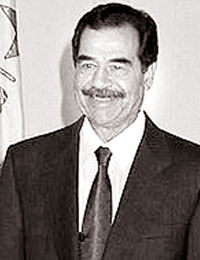Discriminating about dictators, strengthening democracy
Prof Rajiva Wijesinha, MP
A recent article in the British media asserted ‘their crimes against
humanity live forever - but death always catches up with dictators, one
way or another’. That startlingly meaningless statement was given teeth
with the claim that ‘the way dictators meet their end often lingers as
the defining image of their cruel lives’, a notion illustrated with
pictures of the gruesome deaths of Gaddafi, Saddam Hussein, Mussolini
and Nicolae Ceausescu. There was also a picture of the Japanese war
leader Tojo after he tried to commit suicide, along with pictures of the
dead Stalin and Pol Pot and Mao Ze Dong.
What these dictators had in common was that the West disliked them,
at any rate at the time they died. Missing are characters such as Mobutu
and Bokassa and Idi Amin and Pinochet and Stroessner and Duvalier and
Marcos and Suharto and Chiang Kai Shek, who came to power through
violence, or stayed on and on with no concern for democracy.

Muammar Gaddafi |

Saddam Hussein |

Benito Mussolini |

Nicolae Ceausescu |
Islamic world
Western hypocrisy however is something we have to live with, and we
need to realize that hypocrisy is not particularly a Western trait. It
is only that, when hypocrisy is combined with great power, it seems
particularly nasty to those who cannot express their own self-interest
quite so forcefully. The West should realize this, before it provokes a
backlash.
It should also realize that there are limits to its power, though
this may not seem obvious in the present context. The mess they caused
when they invaded Iraq is a case in point. After the enormous support
they had for the invasion of Afghanistan, support fuelled not only by
the attacks of September 11, 2001 but also the excesses of the Taleban
regime, they threw away that goodwill by attacking Saddam Hussein on
trumped up causes.
Saddam Hussein was not someone who deserves our sympathy, but that
had been the case even when he was the darling of the West, supported
because of the animosity of the West, or rather the United States, to
Iran. The volte face that took place subsequently was much more
surprising than in the case of the Taleban, which had also been adored
when they opposed the Soviet Union, but in this case the attack on the
Twin Towers provided good reason. With regard to Saddam, the fact that
the excuses were trumped up was obvious, and contributed much to the
feeling in the Islamic world that the West, or rather the Anglo-Saxons,
were opposed to Muslims in general.
Arab Spring
Efforts to overcome this have been successful recently, with the Arab
states throwing their weight too against Gaddafi this year. It was
obvious too that ruthless self-interest was not the only reason, for the
West had been prepared to support also the protests against the
long-standing leaders of Tunisia and Egypt who had by and large served
Western interests well. Extending the impact of the Arab Spring to Libya
too then, even though it was more obviously a wonderful prize for the
West, in economic as well as political terms, was not obviously based on
pure self-interest, but suggested concern too about what the people of
the area concerned wanted.
But it should also be noted that the intervention in Libya, while it
went far beyond what had originally been envisaged, was initially in
terms of a Resolution of the Security Council. The Western media
delights in claiming that dictatorial regimes are protected by Russia
and China, but as we know the West also protects, to use I think Lyndon
Johnson’s characterization, their own bastards. It is just that Russia
and China, given their own perspective on national sovereignty, do not
bring up cases, so that the West is saved the embarrassment of
exercising its veto, except in the case of Israel.
And when the problem is obvious, as was envisaged when the doctrine
of the Responsibility to Protect was first agreed on by the United
Nations, Russia and China do not exercise vetoes.
We saw this in what I have pointed out, in response to the facile
claim that the West engineered three wars against Islamic nations in its
own interests, were the first Iraq case and the war against Afghanistan.
Military intervention
So, perhaps given an obvious case of abuse by the intemperate
pronouncements of one of the Gaddafi offspring when there was an
uprising in Benghazi, intervention to protect was approved by the
Security Council with regard to Libya earlier this year.
It remains now to be seen whether, flushed with success, the West
will push its desire for a similar intervention in Syria to a triumphant
conclusion. If so, I believe, it will be a conclusion of the sort that
we saw in Iraq, where thousands will be sacrificed, resentments will be
engendered that will strengthen Islamic sentiment that sees the West as
confrontational and oppressive, and what might have been a positive
future for the original theatre of intervention is sacrificed.
That would be tragic. There is a chance now for Libya to develop a
democratic tradition that will contribute to equitable prosperity, but
further adventurism will hand it over to the forces of resentment.
I was reminded, seeing a suggestion that it was time NATO withdrew,
of the hope expressed in 2003 that the United Nations would be able to
oversee transition in Iraq, a hope promptly shot down by a triumphalist
United States that made it clear the decisions would be made by those
who had intervened militarily.
Economic strength
This time round there is a larger group of Western nations who led
the military intervention, but there were others too. Though they are
not likely to go against Western interests, at least they will present a
perspective that appreciates the aspirations of the Libyan people. But
they should also give weight, if only to ensure that resentments based
on perceptions of exploitation will not flourish, to the United Nations,
and the world community, not simply a coalition of military
interventionists.
This is an opportunity for the West to pay due attention to what
might be termed a Third World perspective, and the moderating influence
of countries such as India and Brazil and South Africa. I have long
argued that the first, certainly, should have a permanent place on the
Security Council, and I believe now that the same applies to Brazil too,
given its obvious primacy in South America, in terms of numbers as well
as economic strength.
While I can see the arguments of other countries in this regard, they
are subject to challenge whereas the importance of these two is
unquestionable.
Such reforms may take time. But as world dynamics shift, following
the death of Colonel Gaddafi, it would be good to ensure a consensual
approach to readjustments, and giving due weight to other perspectives,
where democracy has not been in doubt in recent years, would be
extremely productive in the long term. |



